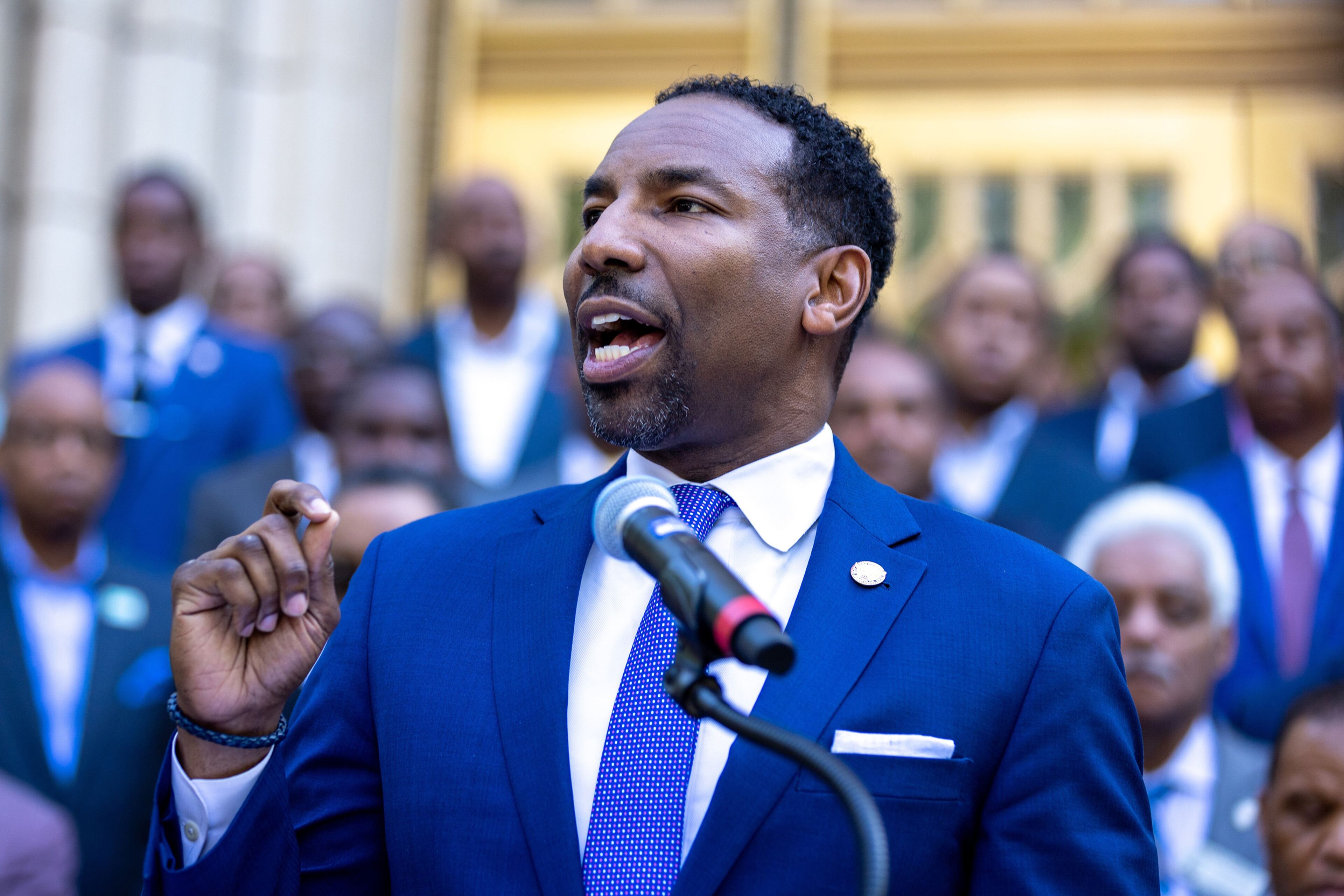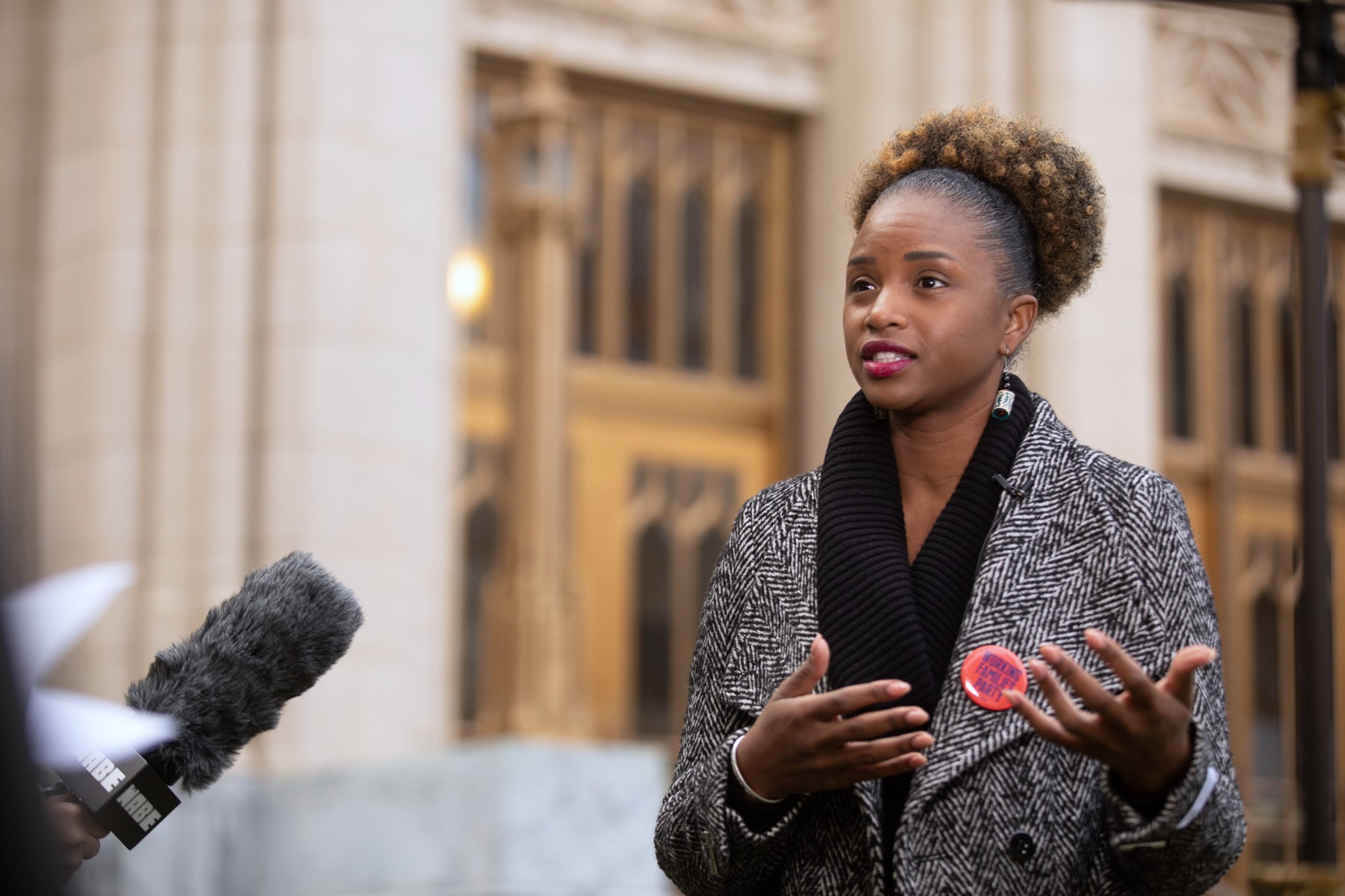Analysis reveals Atlanta training center petition effort may fall short

When opponents of Atlanta’s controversial public safety training center towed 16 boxes of petition signature pages to City Hall in September, they declared an early victory in the effort to force a public vote on the project.
Petitioners said they submitted more than 116,000 signatures — well above the 58,231 needed to trigger a referendum — to the clerk’s office in white cardboard boxes, each sealed with a single piece of tape.
But the Vote to Stop Cop City coalition was well aware of the reality of the petition process: Experts say a large chunk of names collected in any referendum effort are usually not valid.
Namely, the signatures must be from people who are currently registered to vote in the city of Atlanta, and who were registered in 2021. In this petition drive, the law requires signatures from 15% of registered voters eligible for the last general municipal election, which was in 2021.
An analysis of a sample of petition pages by The Atlanta Journal-Constitution and three partnering news organizations found that if petition organizers have met their goal, it is likely by a narrow margin.
A hand count of the petition papers by the AJC, The Associated Press, Georgia Public Broadcasting and WABE found organizers actually turned in 108,500 signatures — short of the 116,000 they have claimed.
That difference could have consequences.
The news organizations found from a random sample of 1,000 entries that nearly half could not be matched to an Atlanta voter meeting the eligibility qualifications. Many non-Atlanta residents signed the petition forms while some others provided far too little information for the news organizations to match with a voter.
Still, the sample finds it’s possible that organizers met their target. But pending legal disputes and questions surrounding how the city will verify signers’ eligibility could drastically shrink the total of valid signatures.
The public safety center has been pitched by two Atlanta mayors as a crucial need for the city’s police and firefighters who have been training in rundown — and even some condemned — facilities. City Council members approved the project through votes on both the ground lease agreement between the city and the Atlanta Police Foundation in 2021 and the funding package for construction this year.
Atlanta Mayor Andre Dickens has said that construction is well underway with expected completion in December 2024.
But the $90-million training center has fueled fears from opponents of increased militarization of police and irreversible environmental damage to the South River Forest where it sits. Clashes over the project include the fatal police shooting of an environmental activist, fiery standoffs with law enforcement in which equipment was destroyed and weighty RICO charges leveled against dozens of protesters.
Opponents say city officials should feel called to put the facility to a citywide vote, regardless of whether they meet the minimum number of required signatures.
“The people who signed those papers — they’re real, they exist,” said Britney Whaley, an organizer with the petition drive. “They want to see it on the ballot and they’re not going away. We have enough signatures to transform politics in Atlanta.”
Both Dickens and the Municipal Clerk’s office declined repeated requests for on-the-record interviews for this story.

Who counts and who doesn’t?
Analysis of 1,000 entries found 48% could be successfully matched to eligible registered voters, and therefore valid.
A similar percentage could not be matched to eligible registered voters by any reasonable method. About 5% were undetermined, such as those with common names that match registered voters but don’t match the registration address.
Relying on statistical sampling to predict how the sample represents the entire population of signers, that would mean as few as 48,250 and as many as 54,800 signers are unquestionably valid — not enough to trigger a vote. While the “undetermined” portion of the sample and the margin of sampling error of about 3% could give petitioners additional valid entries, other entries could be disqualified for other reasons the sample could not detect.
For example, sampling does not necessarily detect duplicate entries or forgeries. And sampling cannot predict the success rate of a “curing” process that allows signers to present additional information if their entry is not able to be verified.
The media partners’ analysis did not attempt to verify whether signatures on the petition match signatures on voter registration, something the city may consider doing as part of its verification. Nor could media partners verify birth dates, because the city did not make birth dates on the petitions public.
A petition signer could be considered ineligible if they were not registered to vote in 2021, live outside of city of Atlanta limits or if their information was illegible or incomplete. Others signed with fake names like “Lord Jesus,” or listed their address as “homeless.”
The process of verification by the city and methods used to address questionable signatures could affect the outcome.
Mark Brewer is an election expert and lawyer in Michigan who has been involved in dozens of petition reviews. Brewer said he trains groups to look for similarities in handwriting across every signature page to detect instances of forgery.
“You cannot detect duplication or outright forgery without examining all the petitions and looking for patterns as a whole,” he said.

So, the city faces a tall task of verifying line-by-line some 25,000 pages of signatures in the boxes that are currently under lock and key in the clerk’s office.
Although the petition papers were submitted months ago, the city hasn’t begun the lengthy hand-tally and verification process for each signer, citing a pending court case that could impact which signatures count based on when they were collected.
A group of DeKalb residents filed a lawsuit against the city in July, questioning the residency requirement for signature collectors. An initial ruling allowed non-city residents to collect signatures, and extended the deadline by which the petitions had to be turned in.
That ruling has been appealed, and oral arguments are scheduled in that case for Dec. 14. It’s now unclear if signatures gathered during that extended deadline, or by non-Atlanta residents, will be considered valid by the court.
Organizers accuse the clerk’s office of being intentionally vague on how it will go about verifying signature eligibility.
Whaley said the Vote to Stop Cop City coalition is “in the dark” on many questions about the process, such as whether organizers can watch and how the city will handle missing signer information.
“We asked very specific and targeted questions and did not get an answer,” she said. City officials have also declined to answer those same questions from the media partners.
Examples of invalid and undetermined signatures
To analyze the sample of 1,000 signatures, the news organization partners did not attempt to verify signatures. Instead, they sought to verify if a person was an eligible petitioner — someone who currently lives in Atlanta, is registered to vote and was registered in Atlanta the last citywide municipal election in November 2021.
Names and addresses were matched with voter information and signers were given a value of Valid, Invalid or Undetermined.
Below are a few examples of signatures that were found to be Invalid or Undetermined. We have blurred the names and addresses here, where appropriate.
“Undetermined” example
In this instance, the name and address did not match voter data, and there were multiple other people with that name living in Atlanta, making a name match difficult.

“Invalid” example: Not a valid Atlanta address
In this instance, the address listed was outside of Atlanta (in this case, Stone Mountain), thus rendering the signer inelligible to sign the petition.

“Invalid” example: Signer not on the Atlanta 2021 registration list
In this instance, signer gave an Atlanta address, which could be correct today. However, 2021 voter data shows that the same signer was listed at another address outside Atlanta (Powder Springs) in that year.

“Invalid” example: Illegible name and address
Some names and addresses were simply too difficult to read for verification purposes.

SOURCE: Atlanta Journal-Constitution analysis of petitions provided by Atlanta City Clerk’s Office
CREDIT: Pete Corson & Charles Minshew/The Atlanta Journal-Constitution
In September, the clerk’s office released a 7-page document outlining that each paper will be scanned and reviewed line-by-line to see if the listed information matches with the 2021 voter file.
“Where a signature has been deemed Likely Not Genuine by unanimous agreement of two reviewers,” the document says, “those signatures will be flagged for notice to the purported signor and an opportunity to cure the signature deficiency.”
The city has said verifiers will rely on signature-matching if the listed information doesn’t give a clear picture on the validity of a signer — a method that drew harsh criticism from Democrats like U.S. Sen. Raphael Warnock.
City officials have promised that there will be a curing process for questionable signers, meaning there will be an opportunity to prove eligibility.
The city has hired a team of election experts as well as former Atlanta municipal clerk Foris Webb III — who retired just months ago — to aid in a detailed signature validation process that includes verifying residency, name spelling and addresses against the signer’s voter registration.
But it is still unknown how the city will treat entries that don’t have an address that matches voter registration rolls.
“It’s not supposed to be a political thing,” Whaley said of the petition process. “We want (the city) to open up democracy to the people and we see this as an avenue for (it) to do that.”

City Council members have been caught in a firestorm of public comment against the project from its inception in 2021. Organizers have called for the legislative body to put the facility directly on the ballot.
While council members who support the project are adamantly against bypassing the petition drive, there have been discussions within City Council about cementing rules regarding the verification process into city code.
Even Councilman Michael Julian Bond, who has consistently voted in favor of the facility, said the missteps of the petition process so far could have been avoided.
“I think that the issues that actually have the city in court, is because people on the outside and people on the inside didn’t fully understand how to proceed,” Bond said.
The hefty $90 million price tag for the training center construction is the reason southwest Atlanta resident Kinyana Gray signed the petition. Atlanta taxpayers will cover about $67 million of the total cost.
“I feel like that money could be used for something else to benefit the community,” Gray said. “I think they should value our opinions, the people who live in the community.”
A local issue?
Some supporters of Atlanta’s public safety training center consistently argue that local opposition to the facility only comes from neighborhoods closest to the 85-acre construction site in unincorporated DeKalb County.
The area of the South River Forest has a brutal history that includes being home to a prison farm. In more recent years, it was sometimes used by the Atlanta Police Department for various training exercises.
Of the eligible voters in the sample, 38% are from five ZIP codes surrounding the proposed training center site.
“People who share the zip code (with the facility) are more likely to be involved,” said Whaley, who noted conversation surrounding the project has been brewing in those areas for years.
She pushed back against the idea that canvassers didn’t spread out in areas that have more residents who support the facility. Whether it was at a Beyonce concert or a local grocery store, she said, petition collectors wouldn’t let residents walk away without at least hearing them out.
Few signatures came from neighborhoods in northern parts of the city. Only 4% of eligible signers came from Atlanta ZIP codes that include Buckhead — which consists of more white, conservative voters who are assumed to be more supportive of the training center.

Bond holds a citywide position on City Council. He said, in his experience, residents who live farther away from the construction site look at public safety as a broader issue.
“I’ve just simply found that the further away, geographically, you are from this actual facility, that people are less concerned or less knowledgeable about it,” he said. “All politics are local, even down to the block-by-block neighborhood level.”
It’s unclear whether north Atlanta residents refused to sign the petition, or if organizers skipped the area due to the suspected lack of support for the referendum effort in those neighborhoods.
Brewer said that the high number of signatures from the same areas of the city may result in a lot of duplicate signers.
“(Organizers) were so focused in about five zip codes, there’s an enormous risk of duplication,” he said. " If you keep going back to the same place, over and over and over again, people don’t remember if they signed the petition or not.”
Why we did it:
The Atlanta Journal-Constitution, along with three media partners, conducted a statistical analysis of entries on petitions trying to force a referendum on Atlanta’s public safety training center. The effort was meant to provide transparency and clarity to the public about the amount and quality of the signatures turned in, and the difficult verification process that lies ahead.



